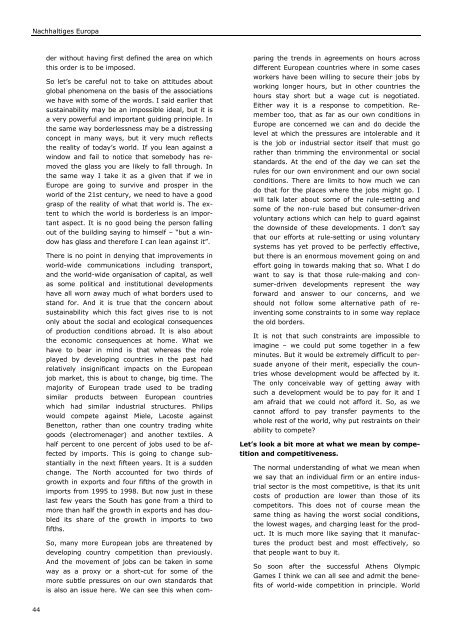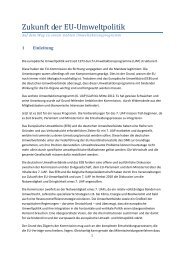Nachhaltiges Europa Abschlusspublikation - Global Marshall Plan
Nachhaltiges Europa Abschlusspublikation - Global Marshall Plan
Nachhaltiges Europa Abschlusspublikation - Global Marshall Plan
Erfolgreiche ePaper selbst erstellen
Machen Sie aus Ihren PDF Publikationen ein blätterbares Flipbook mit unserer einzigartigen Google optimierten e-Paper Software.
<strong>Nachhaltiges</strong> <strong>Europa</strong><br />
44<br />
der without having first defined the area on which<br />
this order is to be imposed.<br />
So let’s be careful not to take on attitudes about<br />
global phenomena on the basis of the associations<br />
we have with some of the words. I said earlier that<br />
sustainability may be an impossible ideal, but it is<br />
a very powerful and important guiding principle. In<br />
the same way borderlessness may be a distressing<br />
concept in many ways, but it very much reflects<br />
the reality of today’s world. If you lean against a<br />
window and fail to notice that somebody has re-<br />
moved the glass you are likely to fall through. In<br />
the same way I take it as a given that if we in<br />
Europe are going to survive and prosper in the<br />
world of the 21st century, we need to have a good<br />
grasp of the reality of what that world is. The extent<br />
to which the world is borderless is an impor-<br />
tant aspect. It is no good being the person falling<br />
out of the building saying to himself – “but a window<br />
has glass and therefore I can lean against it”.<br />
There is no point in denying that improvements in<br />
world-wide communications including transport,<br />
and the world-wide organisation of capital, as well<br />
as some political and institutional developments<br />
have all worn away much of what borders used to<br />
stand for. And it is true that the concern about<br />
sustainability which this fact gives rise to is not<br />
only about the social and ecological consequences<br />
of production conditions abroad. It is also about<br />
the economic consequences at home. What we<br />
have to bear in mind is that whereas the role<br />
played by developing countries in the past had<br />
relatively insignificant impacts on the European<br />
job market, this is about to change, big time. The<br />
majority of European trade used to be trading<br />
similar products between European countries<br />
which had similar industrial structures. Philips<br />
would compete against Miele, Lacoste against<br />
Benetton, rather than one country trading white<br />
goods (electromenager) and another textiles. A<br />
half percent to one percent of jobs used to be affected<br />
by imports. This is going to change substantially<br />
in the next fifteen years. It is a sudden<br />
change. The North accounted for two thirds of<br />
growth in exports and four fifths of the growth in<br />
imports from 1995 to 1998. But now just in these<br />
last few years the South has gone from a third to<br />
more than half the growth in exports and has doubled<br />
its share of the growth in imports to two<br />
fifths.<br />
So, many more European jobs are threatened by<br />
developing country competition than previously.<br />
And the movement of jobs can be taken in some<br />
way as a proxy or a short-cut for some of the<br />
more subtle pressures on our own standards that<br />
is also an issue here. We can see this when com-<br />
paring the trends in agreements on hours across<br />
different European countries where in some cases<br />
workers have been willing to secure their jobs by<br />
working longer hours, but in other countries the<br />
hours stay short but a wage cut is negotiated.<br />
Either way it is a response to competition. Remember<br />
too, that as far as our own conditions in<br />
Europe are concerned we can and do decide the<br />
level at which the pressures are intolerable and it<br />
is the job or industrial sector itself that must go<br />
rather than trimming the environmental or social<br />
standards. At the end of the day we can set the<br />
rules for our own environment and our own social<br />
conditions. There are limits to how much we can<br />
do that for the places where the jobs might go. I<br />
will talk later about some of the rule-setting and<br />
some of the non-rule based but consumer-driven<br />
voluntary actions which can help to guard against<br />
the downside of these developments. I don’t say<br />
that our efforts at rule-setting or using voluntary<br />
systems has yet proved to be perfectly effective,<br />
but there is an enormous movement going on and<br />
effort going in towards making that so. What I do<br />
want to say is that those rule-making and con-<br />
sumer-driven developments represent the way<br />
forward and answer to our concerns, and we<br />
should not follow some alternative path of re-<br />
inventing some constraints to in some way replace<br />
the old borders.<br />
It is not that such constraints are impossible to<br />
imagine – we could put some together in a few<br />
minutes. But it would be extremely difficult to persuade<br />
anyone of their merit, especially the countries<br />
whose development would be affected by it.<br />
The only conceivable way of getting away with<br />
such a development would be to pay for it and I<br />
am afraid that we could not afford it. So, as we<br />
cannot afford to pay transfer payments to the<br />
whole rest of the world, why put restraints on their<br />
ability to compete?<br />
Let’s look a bit more at what we mean by competition<br />
and competitiveness.<br />
The normal understanding of what we mean when<br />
we say that an individual firm or an entire indus-<br />
trial sector is the most competitive, is that its unit<br />
costs of production are lower than those of its<br />
competitors. This does not of course mean the<br />
same thing as having the worst social conditions,<br />
the lowest wages, and charging least for the product.<br />
It is much more like saying that it manufac-<br />
tures the product best and most effectively, so<br />
that people want to buy it.<br />
So soon after the successful Athens Olympic<br />
Games I think we can all see and admit the benefits<br />
of world-wide competition in principle. World
















